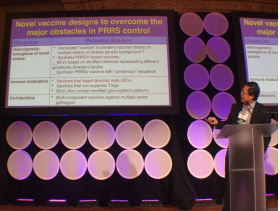



Exciting Research Featured at North American PPRS Symposium
ANALYSIS - Innovative research to help stop the spread of Porcine Reproductive and Respiratory Syndrome virus (PRRS) and tools to identify outbreaks of PRRS and other emerging diseases were the focus of the North American PPRS symposium held in Chicago December 5-6, 2015, reports Sarah Mikesell live from event.More than 250 swine veterinarians, researchers, students and industry professionals attended the PPRS conference and shared the latest research through presentations, a poster session and abstract talks.
Reid Phillips, DVM and technical manager at Boehringer Ingelheim, speaks to ThePigSite's Sarah Mikesell about the symposium and the use of research innovations in the swine industry.

Dr. Phillips said this conference is unique in that researchers are doing innovative research and really pushing the envelope to make new discoveries not just for PPRS, but for other diseases as well.
He said there's also transitional research presented that looks at applying the research in the field and then lastly, taking the research and actually applying it on-farm and measuring it.
The keynote speakers were very much a "Who's Who" of the PPRS swine sector.

XJ Meng, Virginia Tech, delivered the keynote address - Designing PRRSV Vaccines for Heterologous.
Randy Prather, University of Missouri, shared exciting research involving genetic engineering of pigs that showed that CD163 pigs are resistant to PRRSv, indicating that CD163 is a gatekeeper.
Lindsey Holmstrom, Kansas State University, spoke to the group about the implementation of the Enhanced Passive Surveillance System which is designed to monitor and detect emerging animal diseases across the US.
Other speakers covered biosurvellance, metagenomic sequencing, emerging strains of PRRS including 174 and epidemiology.










